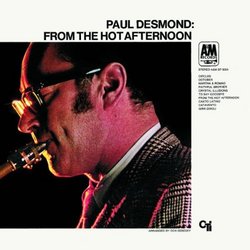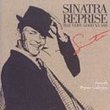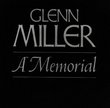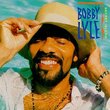| All Artists: Paul Desmond Title: From the Hot Afternoon Members Wishing: 3 Total Copies: 0 Label: Polygram Records Release Date: 4/4/2000 Genres: Jazz, Pop Style: Cool Jazz Number of Discs: 1 SwapaCD Credits: 1 UPCs: 731454348720, 0731454348720 |
Search - Paul Desmond :: From the Hot Afternoon
 | Paul Desmond From the Hot Afternoon Genres: Jazz, Pop
|
Larger Image |
CD DetailsSimilarly Requested CDs
|
CD ReviewsDesmond, yes; Sebesky, no R. LaRue | Crozet, VA United States | 01/13/2003 (1 out of 5 stars) "Ostensibly, From the Hot Afternoon is a showcase for a couple of post-Jobim/Gilberto Brazilian song writers and for some new Brazilian instrumental and vocal talent. This sounds like an interesting idea for an album. To be sure, Desmond had a remarkable flair for the bossa nova style. He even recorded an album with Jim Hall in 1962 called Bossa Antigua which contains several of Desmond`s own lovely bossa-style compositions. (This, despite the ruefully punning title, was only two years after Getz and Byrd recorded the ground-breaking Jazz Samba, which introduced American jazz fans to the "new thing" and started a craze in jazz and popular music of the time.)Anyway, it must have seemed like a good idea to everyone, even as late as 1969, to return for another take on the Brazilian jazz-samba style. Unfortunately, the two featured composers--Milton Nascimento and Edu Lobo--are not remotely in the same league with someone like Antonio Carlos Jobim; nor is the rhythm section (with the exception of Ron Carter on bass) up to the caliber of Jim Hall's guitar and Connie Kay's drums on Bossa Antigua. But these problems would not alone be enough to completely sink an album featuring the incomparable Paul Desmond.What does succeed in ruining it, though, is Don Sebesky. For some reason, Sebesky was hired to add light orchestral arrangements ("sweetening" it was called) to many jazz albums that were produced by Creed Taylor in the late 70's-including several other Desmond/CTI releases as well as sessions by other jazz greats. Whether the incorporation of these dreadful over-dubbed orchestrations was a symptom of blatant commercialization, or whether Taylor genuinely thought it constituted some kind of revolutionary pop/jazz/classical fusion, I don't pretend to know. But I do know the results are, to say the least, un-jazzy. Sebesky's arrangements are so insipid that they make elevator music seem exciting--so pop and goofy that they make new-age music seem hot. Moreover, they are so poorly realized that they even submerge the principal musicians! You have to constantly switch channels just to hear Desmond over all the strings, flutes, French horns, clarinet, oboe, harp, and electric piano. Can it be that some engineer really thought Desmond's alto merited no more prominence that the first violin or the oboe? The final result, then, is a miasma of muzak, with the ghost of a jazz giant floating around in it.Still, there is a reason for a diehard Desmond fan (like myself) to own this re-release; and that is for the extra takes that are laid down without the overdubbed orchestra parts, thus giving us a chance to hear Desmond in his natural, small-group setting. Sad to say, however, these takes seem uninspired at best-especially when compared with the same sort of music and the same sort of instrumentation that resulted in the effort captured on Bossa Antigua. On the Hot Afternoon tracks Desmond sounds like he's spinning his wheels, rather than giving out with the remarkable lyrical invention that graces all of his work prior to and after this lamentable Sebesky period. On most of these cuts, he takes a modal and undirected approach to his improvisations. He seems to be playing almost as if he knew that his voice would be lost in the mixing anyway--playing like an accompanist, rather than like the featured soloist. Moreover, the cuts are all traditional pop-song length (two and a half to four minutes), which is not a format Desmond ever used, or sounds good on, either with the Brubeck quartet or with his own groups. Desmond once remarked that he was not the type of musician to dominate a session-that his work very much depended on a rapport with his fellow band members. This album seems to prove the point: without a seasoned rhythm section, good material, and room to stretch, even the greatest of alto players found himself far too constrained to produce his best work." Desmond's tribute to Nascimento and Lobo 05/04/2000 (5 out of 5 stars) "Paul Desmond FROM THE HOT AFTERNOON was originally released on vinyl as A&M SP 3024 in 1969. It was available as CD 824 during the late 80s but has been out of print until now. Thanks to Verve's tremendous reissue program, those who missed out earlier can have it. All songs on this set were written by two premier Brazilian jazz performers and composers, Milton Nascimento and Edu Lobo. In fact Lobo sings and plays guitar on this album. "Faithful Brother" and "Catavento" are my favorite tunes (both by Nascimento). "To Say Goodbye" has an interesting twist. The arrangement was set in a key so low that Vocalist Wanda de Sah could barely whisper the low notes. Rather than change the register, Desmond kept it, a brilliant move which enhanced the tragic effect of the lyrics. Fans of Desmond's A&M work can anticipate the planned reissue of his double LP on A&M/Horizon, QUARTET LIVE. Perhaps soon Verve will be kind enough to issue SUMMERTIME (A&M SP 3015) and BRIDGE OVER TROUBLED WATER (A&M SP 3032), both of which have been unavailable on domestic CD thus far. If you already own a copy of FROM THE HOT AFTERNOON, consider buying the Verve reissue to get the outtake bonus tracks. A real treat!" Cool jazz from the master. ellafan | MI | 01/13/2002 (5 out of 5 stars) "Desmond manages to simmer, sizzle, and be sultry all at once with these cuts. He said, I hear, that he wanted to sound like a dry martini. Well..he suceeded on all of his albums. This one is one of the best."
|

 Track Listings (16) - Disc #1
Track Listings (16) - Disc #1



